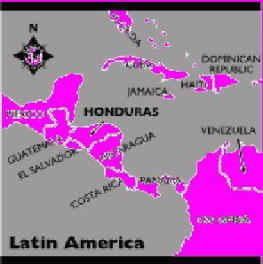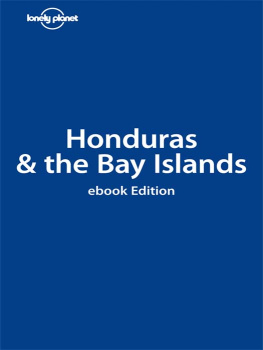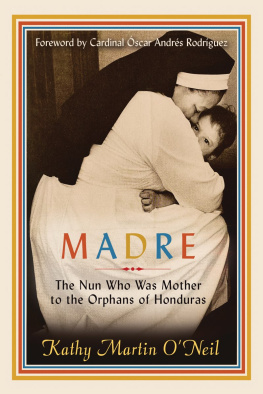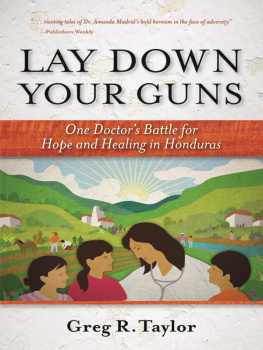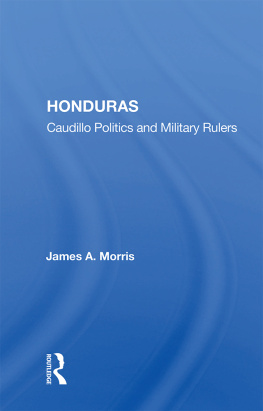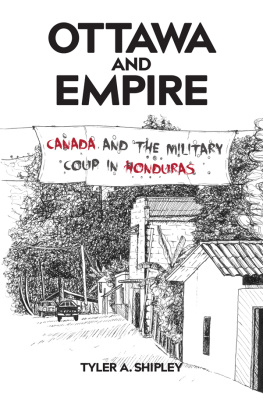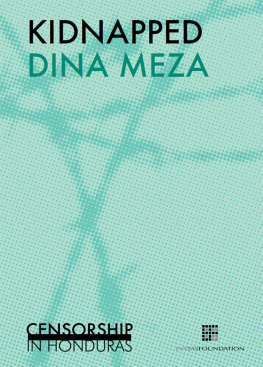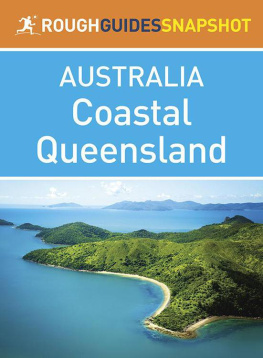Tegucigalpa & Southern Honduras
Cindy Kilgore & Alan Moore
HUNTER PUBLISHING, INC,
www.hunterpublishing.com
Ulysses Travel Publications
4176 Saint-Denis, Montreal, Quebec
Canada H2W 2M5
tel. 514-843-9882, ext. 2232; fax 514-843-9448
Windsor Books
The Boundary, Wheatley Road, Garsington
Oxford, OX44 9EJ England
tel. 01865-361122; fax 01865-361133
Hunter Publishing, Inc.
This and other Hunter travel guides are also available as e-books through NetLibrary.com, EBSCO and other digital partners. For more information, e-mail us at
comments@hunterpublishing.com.
All rights reserved. No part of this publication may be reproduced, stored in a retrieval system, or transmitted in any form, or by any means, electronic, mechanical, photocopying, recording, or otherwise, without the written permission of the publisher.
This guide focuses on recreational activities. As all such activities contain elements of risk, the publisher, author, affiliated individuals and companies disclaim responsibility for any injury, harm, or illness that may occur to anyone through, or by use of, the information in this book. Every effort was made to insure the accuracy of information in this book, but the publisher and author do not assume, and hereby disclaim, liability for any loss or damage caused by errors, omissions, misleading information or potential travel problems caused by this guide, even if such errors or omissions result from negligence, accident or any other cause.
- Introduction
- Using This Guide
- History
- The Maya
- Pre-Classic Period
- Classic Period 300-900 AD
- Discovery
- La Conquista
- Lord of the Mountain
- Mining Era
- Independence
- General Francisco Morazn
- A Nation at Last
- Liberal Reforms
- Dictatorship
- Coup D'Etat
- Soccer War
- Contragate
- Dirty War
- The Democratic Process
- Hurricane Mitch
- Land/Geography
- Rivers & Lakes
- Lake Yojoa
- Climate
- The Rainforest
- Crown Shyness & Other Forms of Pest Control
- Rainforest Layers
- Why Are Rainforests Important?
- Rainforest Biodiversity & Climate Control
- Stresses to the Rainforest
- The Consequences of Rainforest Loss
- Wildlife
- Land Mammals
- Marine Life
- Reptiles
- Birds
- Butterflies, Insects & Other Small Creatures
- Government
- Economy
- People/Culture
- Indigenous Peoples
- Holidays
- Festivals
- Golden Rules of Eco-Tourism
- Travel Information
- Money Matters
- Telephone Services
- Mail
- Drinking Water
- Food
- Shopping
- Hospitals, Clinics & Pharmacies
- Handicap Accessibility
- When to Visit
- Clothing
- Safety
- Getting Here
- Getting Around
- Tegucigalpa & Southeast Honduras
- History
- Getting There
- By Plane
- By Bus
- Getting Around
- Practicalities
- Shopping
- Newspapers
- Photography
- Laundry
- Adventures in Town
- Iguana Adventure
- Adventures near Tegucigalpa
- Day-Trips
- The National Parks
- La Tigra National Park
- El Picacho
- Where to Stay in Tegucigalpa
- Where to Eat
- Southeast Honduras
- Zamorano
- Yuscarn
- Danli
- To Nicaragua
- La Moskitia & Olancho
- La Moskitia: Central America's Last Frontier
- People
- History
- Getting There
- Guided Travel is the Recommended Way
- Birding La Moskitia
- The Rio Pltano Biosphere Reserve
- Palacios
- Practicalities
- Adventures in & Around Palacios
- Where to Stay
- Where to Eat
- Nightlife
- Las Marias, a Miskito & Pech Village
- Getting There
- Lodging
- Guides
- Tropical Rainforest Excursions from Las Marias
- The Pech
- Rio Pltano Rafting Expedition
- Brus Lagoon
- Getting There
- Adventures
- Where to Stay & Eat
- Puerto Lempira
- Getting There
- Practicalities
- Where to Stay & Eat
- Adventures Around Puerto Lempira
- Olancho
- Eco-Adventures Well off the Beaten Track
- Illegal Logging
- Getting There
- Juticalpa
- Getting There
- Practicalities
- Where to Stay
- Where to Eat
- La Muralla National Park
- Getting There
- Catacamas
- Getting There
- Practicalities
- Where to Stay
- Where to Eat
- Adventures
- Santa Maria del Carbon
- Getting There
- La Cascada
- The South Coast
- Choluteca
- Getting There
- Practicalities
- Where to Stay
- Where to Eat
- Sites Near Choluteca
- Appendix
- Embassies or Consulates
- Speaking Spanish
- Pronunciation
- Greetings
- Travel
- Driving
- Landmarks & Addresses
- Days of the Week
- Months of the Year
- Numbers
- Common Phrases
- Food
- Health
- Animals
- Currencies
- Suggested Reading
- Periodicals & Other Information Sources
- Internet Resources

Economy
This is one of the poorest and least developed countries in Latin America. Industrial development has been limited, and historically the economy has been dependent on agricultural exports, such as coffee and bananas. However, Hurricane Mitch deeply affected the banana industry and coffee exports have been reduced by a slump in world prices.
However, in the past 15 years, the economy has been diversified, with the development of non-traditional exports such as cultivated shrimp and melons, and the establishment of the maquila industry (primarily, assembly for re-export of textiles and apparel). The maquila industry, drawing on an incredibly low-paid work force, is now the second-largest in the world, and also the major generator of export revenues for Honduras. However, the 2005 liberalization of China's export quotas could seriously affect Honduras. Tourism, which is growing in leaps and bounds, appears to be the most promising factor for future economic growth - if tourist activities are carefully monitored to avoid destruction of delicate ecosystems, which are the primary attraction, and if soaring post-Hurricane Mitch crime rates are contained. The current President, Ricardo Maduro, won the election in 2000 on an anti-crime platform, and has passed strong anti-gang legislation during his term of office. However, gruesome gang violence continues and drug trafficking and money laundering are major industries. Although increased police presence has reduced the official crime rate, providing social stability would achieve better results. The lack of opportunity, unemployment, underemployment, poor education, and corruption, together with the unequal distribution of wealth, keep the country in poverty, which fuels popular discontent and violence.
Honduras has extensive forest, marine, and mineral resources, although widespread slash-and-burn agricultural methods and uncontrolled logging continue to destroy Honduran forests.
While inflation has dropped slightly and Honduras continues to maintain stable macroeconomic policies, it has lagged in implementing structural reforms.
Family remittances from Hondurans living abroad (mostly in the United States) rose 19% to $860 million in 2003, and are soon expected to pass the maquila sector as the country's largest source of foreign exchange.

